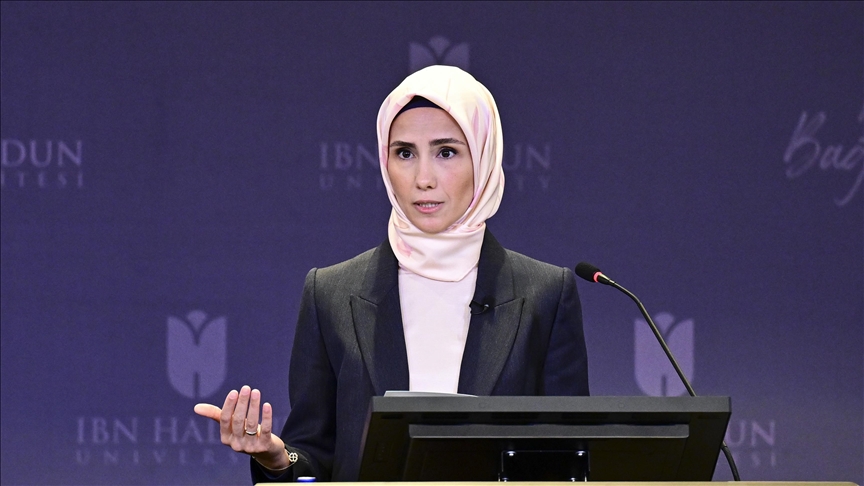Turkish rights advocate urges stronger protection of women’s religious freedoms at workplaces
Sumeyye Erdogan Bayraktar, KADEM board of trustees chairperson, says women should not be forced to choose between faith and career

ANKARA
Sumeyye Erdogan Bayraktar, chairperson of the board of trustees at the Women and Democracy Foundation (KADEM), on Thursday called for broader legal and societal protections for women’s religious freedoms in professional life, with a focus on eliminating discrimination against women who wear the headscarf.
Speaking at the conference, The Right to Believe, The Right to Work: Women’s Religious Freedom in the Workplace, at the Ibn Haldun University in Istanbul, Bayraktar said “women should not have to choose between their beliefs and their careers.”
Reflecting on her own experience during Türkiye’s Feb. 28 post-modern coup period, Bayraktar described the headscarf ban in public institutions as a period when “fundamental rights were taken away.”
She explained how she had to leave her family and city at a young age to complete high school elsewhere, and later pursue university education in the US, which was followed by her master’s degree in the UK, due to restrictions at home.
“Those days are not far behind us,” she said.
On Feb, 28, 1997 the Turkish military forced the then government to resign and implemented strict secular policies, including a nationwide ban on headscarves in public institutions.
Bayraktar acknowledged the progress Türkiye has made in lifting institutional barriers, noting that women can now wear the headscarf freely in public institutions.
However, she warned that challenges persist, particularly in the private sector.
“We still see situations where headscarfed women are passed over for jobs despite their qualifications,” she said.
She cited job postings that discourage applications from women who wear the headscarf, and explained that some applicants have been rejected after positive preliminary evaluations were reversed upon seeing their photos.
“This practice violates the principles of merit, equality and dignity,” she added.
Citing European research, Bayraktar said women wearing headscarves face significant disadvantages in hiring processes, with some studies indicating a 65% lower callback rate for interviews.
“This is not just about religion; this is about the right to exist, to live with dignity, and to work without compromising one’s identity,” she said.
Bayraktar also criticized recent developments abroad, including France’s ban on headscarves in sporting events.
“These actions reflect a mindset that defines religious expression as divisive, which ultimately undermines the principles of inclusion and democracy,” she lamented.
As chair of KADEM, Bayraktar reiterated the foundation’s commitment to defending women’s religious freedoms as part of broader human rights.
“We oppose the top-down imposition of a single narrative about women,” she said, vowing to promote policies that are both rights-based and rooted in local cultural values.
“We believe that protecting religious freedom in the workplace is not only a matter of individual liberty but also a pillar of gender justice,” she added.
Calling for institutions to prioritize “human dignity above all else,” Bayraktar said: “A society that pushes women out of public life because of their appearance can never achieve fairness or equality.”
“We must build a world enriched by our differences and grounded in justice.”
Anadolu Agency website contains only a portion of the news stories offered to subscribers in the AA News Broadcasting System (HAS), and in summarized form. Please contact us for subscription options.







